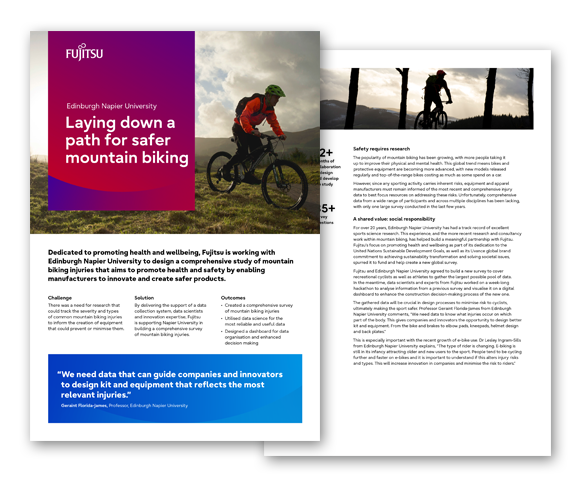Dedicated to promoting health and wellbeing, Fujitsu is working with Edinburgh Napier University to design a comprehensive study of mountain biking injuries that aims to promote health and safety by enabling manufacturers to innovate and create safer products.
Challenge
There was a need for research that could track the severity and types of common mountain biking injuries to inform the creation of equipment that could prevent or minimise them.
Solution
By delivering the support of a data collection system, data scientists and innovation expertise, Fujitsu is supporting Napier University in building a comprehensive survey of mountain biking injuries.
Outcomes
- Created a comprehensive survey of mountain biking injuries
- Utilised data science for the most reliable and useful data
- Designed a dashboard for data organisation and enhanced decision making
We need data that can guide companies and innovators to design kit and equipment that reflects the most relevant injuries.
Geraint Florida-James, Professor, Edinburgh Napier University

12+ months of collaboration to design and develop the study
85+ survey questions
4 number of topics in the survey
- Industry: Education
- Location: Edinburgh, UK
- Customer's website

About the customer
Edinburgh Napier University is a public university located in Edinburgh, Scotland. All the courses are designed in consultation with business and industry to ensure that students receive the relevant academic and practical skills. The Times/Sunday Times Good University Guide 2023 placed it in the top ten modern universities in the UK.
Safety requires research
The popularity of mountain biking has been growing, with more people taking it up to improve their physical and mental health. This global trend means bikes and protective equipment are becoming more advanced, with new models released regularly and top-of-the-range bikes costing as much as some spend on a car.
However, since any sporting activity carries inherent risks, equipment and apparel manufacturers must remain informed of the most recent and comprehensive injury data to best focus resources on addressing these risks. Unfortunately, comprehensive data from a wide range of participants and across multiple disciplines has been lacking, with only one large survey conducted in the last few years.
A shared value: social responsibility
For over 20 years, Edinburgh Napier University has had a track record of excellent sports science research. This experience, and the more recent research and consultancy work within mountain biking, has helped build a meaningful partnership with Fujitsu. Fujitsu’s focus on promoting health and wellbeing as part of its dedication to the United Nations Sustainable Development Goals, as well as its Uvance global brand commitment to achieving sustainability transformation and solving societal issues, spurred it to fund and help create a new global survey.
Fujitsu and Edinburgh Napier University agreed to build a new survey to cover
recreational cyclists as well as athletes to gather the largest possible pool of data. In the meantime, data scientists and experts from Fujitsu worked on a week-long hackathon to analyse information from a previous survey and visualise it on a digital dashboard to enhance the construction decision-making process of the new one.
The gathered data will be crucial in design processes to minimise risk to cyclists, ultimately making the sport safer. Professor Geraint Florida-James from Edinburgh Napier University comments, “We need data to know what injuries occur on which part of the body. This gives companies and innovators the opportunity to design better kit and equipment. From the bike and brakes to elbow pads, kneepads, helmet design and back plates.”
This is especially important with the recent growth of e-bike use. Dr Lesley Ingram-Sills from Edinburgh Napier University explains, “The type of rider is changing. E-biking is still in its infancy attracting older and new users to the sport. People tend to be cycling further and faster on e-bikes and it is important to understand if this alters injury risks and types. This will increase innovation in companies and minimise the risk to riders."
The power of data and collaboration
As well as powering the development of the survey by supplying the IT systems and services, Fujitsu is also providing support with a data collection system, data reflection platforms, data scientists and innovation expertise. This will ensure the most thorough and extensive data study.
Dr Ingram-Sills stresses how comprehensive the study will be: “We really want to promote how good biking is for health and wellbeing. It is a great sport, and we want everyone to be able to enjoy it! So, if we can understand people’s motivations to ride, and the reasons that they don’t, we can recognise ways of making the sport more accessible to all.”
This project is all about data; collecting, reporting, visualisation and processing with added data dashboard synoptics. Over 85 questions are grouped into four topics: demographics, equipment used, recent accidents and riding habits. This means that all aspects of mountain biking, including the bikes themselves (regular and e-bikes), apparel and conditions—such as trail types, terrain or weather—and the respondents’ physical condition are all taken into account, and matched with the most common injuries and their severity.
This global survey is a result of a close collaboration between Edinburgh Napier University and Fujitsu, and the end data will be co-owned. Both bodies are actively involved in making sure the project is successful by maintaining a close working relationship between Fujitsu’s consultants, architects and data experts and the university’s professors and consultants.
The project will provide valuable data that can be used by manufacturers to not only innovate and elevate safer products or inform retailing and manufacturing but also to follow their SDGs and prove environmental, social and governance credentials. The data could also be shared publicly, with athletes and recreational cyclists, to inform their purchasing and exercise decisions.
Efi Sotiropoulou, Systems Architect and Innovation Consultant at Fujitsu, comments: “Data has real power. And this power is something that we talk about but don’t really realise. If we can make this data accessible, we can make a big impact. Fujitsu’s IT services and rich partner ecosystem will provide digital channels to maximise the potential of gathering and harnessing the data that we capture and ensure better industry research to increase the health and safety of mountain bikers."








